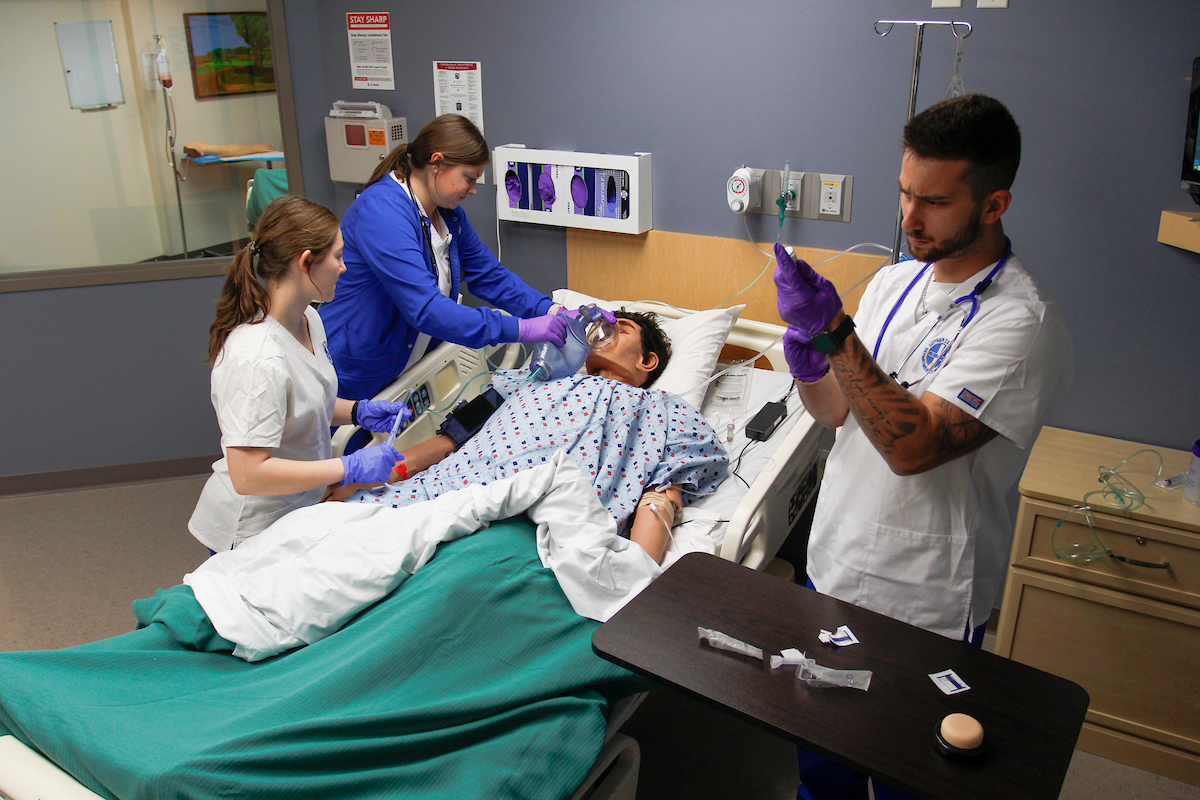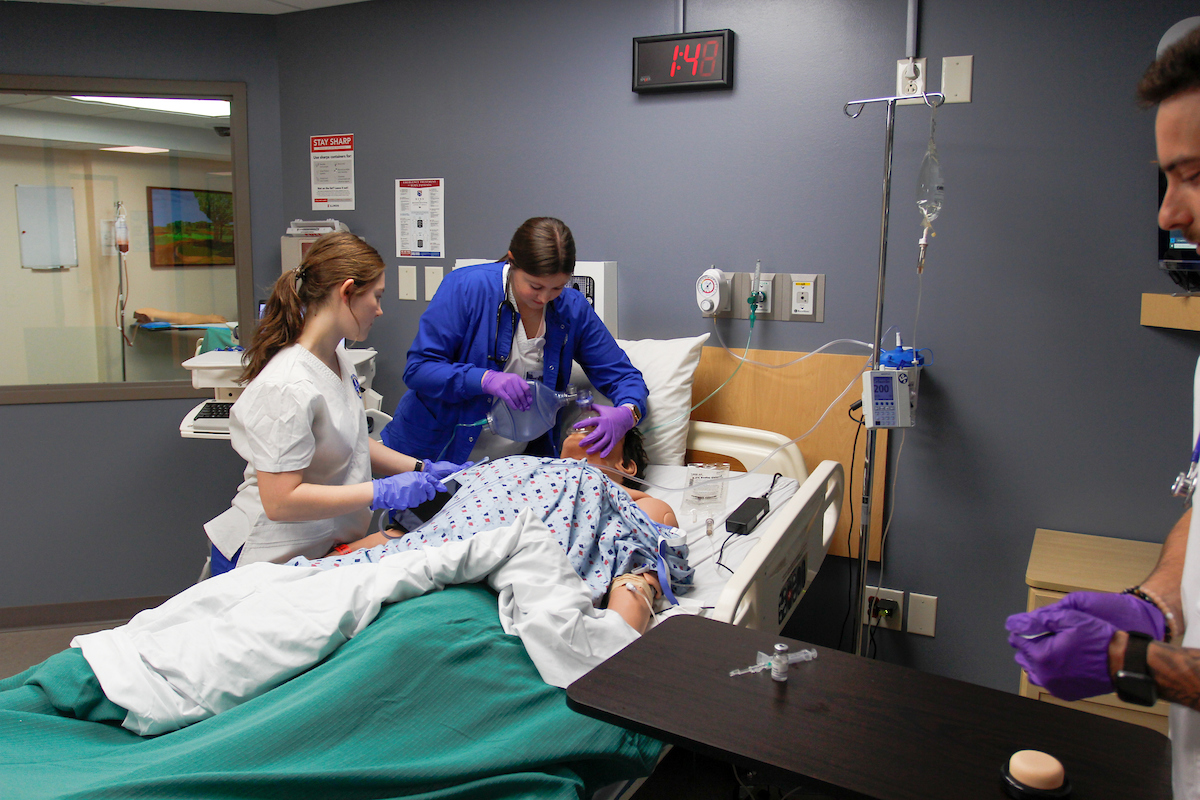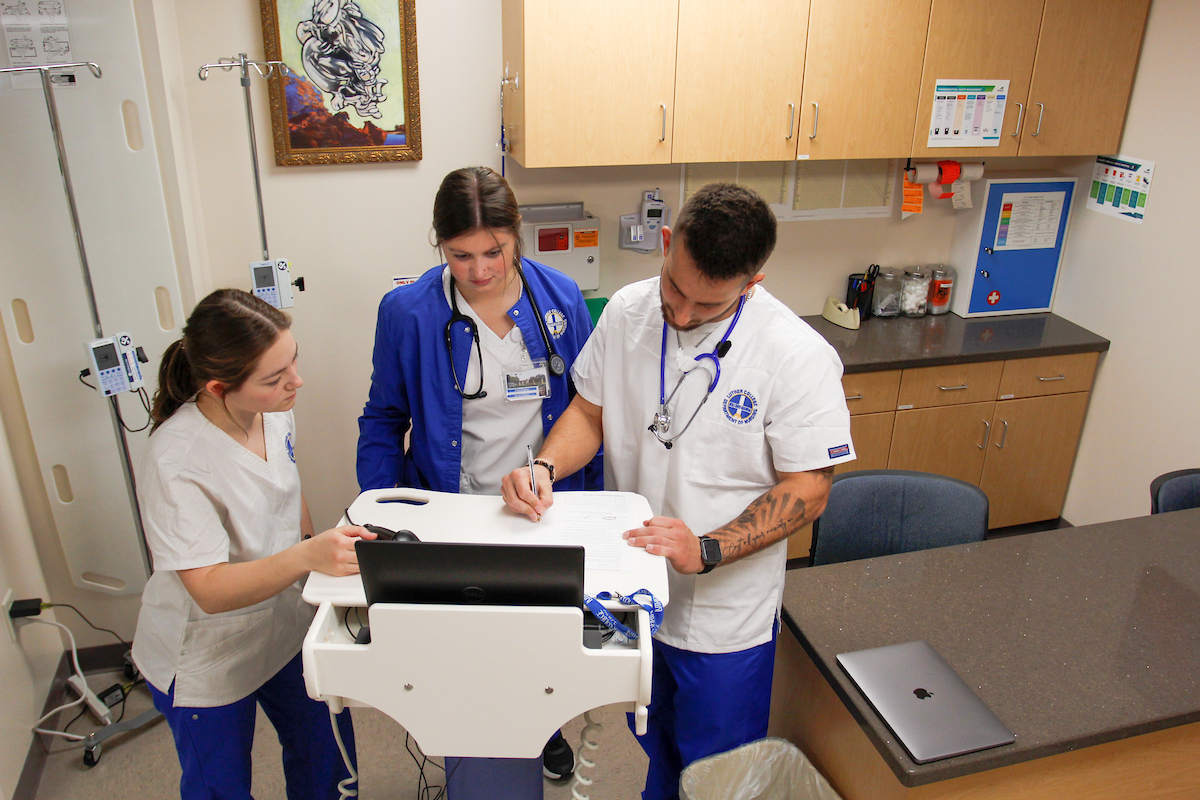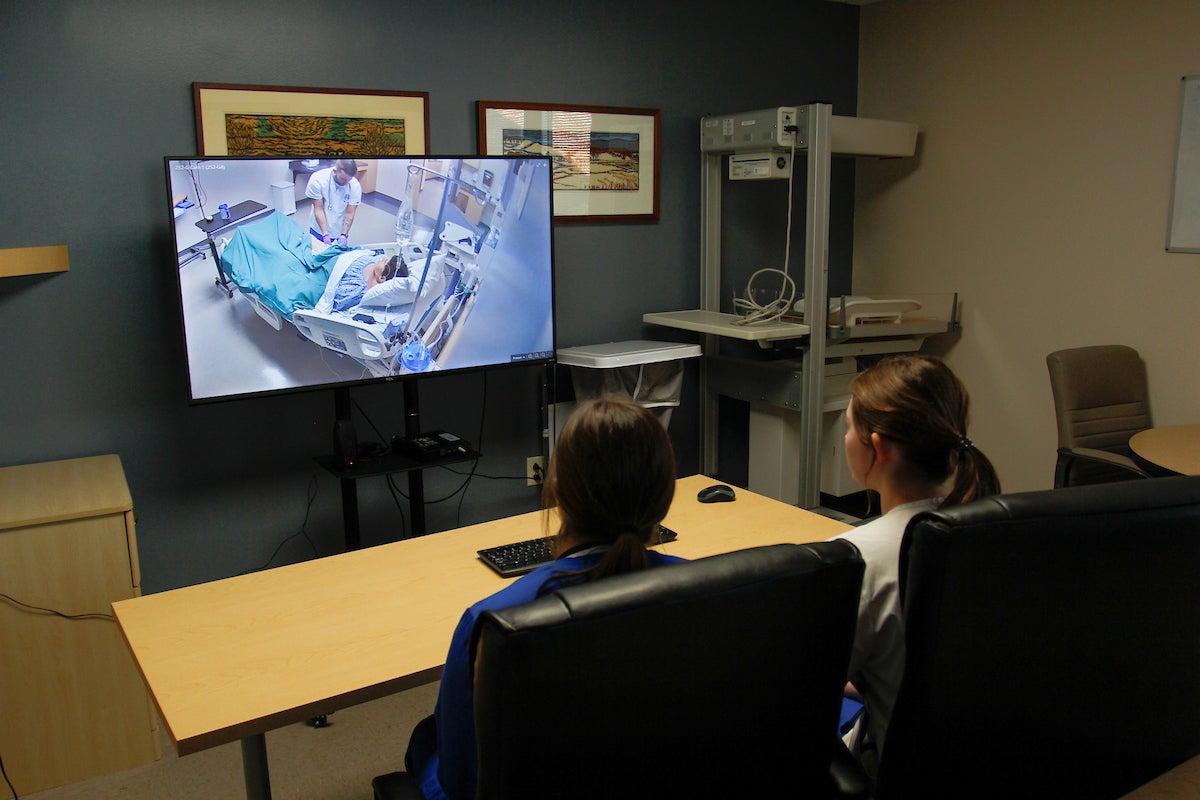Applied Learning
Here you can find in-depth information about applied learning experiences in Luther College nursing.
Students are provided a variety of clinical experiences throughout the program to allow them to develop their skills in unique ways, encounter health care from diverse settings, and explore the nursing profession in distinctive environments.
Sophomore Year
During their sophomore year, students first experience “on-campus clinicals”–lab activities that allow them to grow strong assessment and hands-on interventional skills. Students then move to caring for hospitalized patients at Winneshiek Medical Center and Veterans Memorial Hospital, as well as patients in a same-day surgery environment, clinic setting, and the emergency room.
Junior Year
Junior year finds our students once again experience on-campus clinicals in a simulation-based course. Additionally, students in the population-based course actively participate in clinicals at Winneshiek County Public Health, the Decorah Free Clinic, Health Services (Luther College), and the NE Iowa Food and Fitness
Senior Year
Senior year finds our students living off campus in Rochester, MN, where they spend 2-3 days a week in clinicals at Mayo Clinic, ranked the #1 hospital in the nation. Students are placed in a variety of settings at the world famous medical center, including medical-surgical units, pediatrics, obstetrics, psychiatric units, and progressive and intensive care environments. In addition to clinicals at Mayo Clinic, students also participate in clinicals at Seasons Hospice, the Federal Medical Center, and Rainbow Preschool.
Course Description
This capstone course will include experiences similar to those students are likely to confront as newly employed baccalaureate-prepared registered nurses. Students will have one-on-one work experience with baccalaureate nurse preceptors in selected clinical settings. An emphasis is placed on the development of personal and professional strategies needed to make the transition from student to graduate nurse by highlighting role development skills of bedside nurse leaders.
Course Objectives
- Integrate theoretical concepts from nursing and other disciplines in understanding nursing practice issues.
- Refine personal leadership abilities based on self-assessment and analysis of personal leadership styles.
- Evaluate the health care environment utilizing a systems framework to consider policy, resources, and quality and safety concerns related to the selected nursing practice setting.
- Propose improvements for safe nursing practice using national patient safety initiatives and evidence based research.
- Evaluate and incorporate evidence based research related to professional development for the practice setting.
- Provide evidence based patient centered nursing care for a variety of a patients.
- Evaluate the utilization of patient care technological support systems that support patient care and prevent medical errors in the practice setting.
- Develop collegial relationships with inter- and multidisciplinary team members using management and leadership concepts and therapeutic communication skills while adhering to professional standards and behaviors.
- Prioritize and implement nursing aspects of multidisciplinary health plans which reflect legal and ethical standards of care and practice.
- Perform reflective ongoing self-evaluation of growth in professional nursing practice and attainment of professional practice goals.
- Provide for the safe and effective care of multiple patients and their families through direct care and delegation of care to other members of the health care team.
- Demonstrate the use of critical thinking and clinical judgment as a basis for decision making in clinical practice.
When it Occurs
The capstone course is held after the junior-level courses, either in the summer between junior and senior year, or during January-Term of senior year. You are given the opportunity to choose when you would like to take it. The summer capstone course will be held during Summer Session I, and will not conflict with the summer Population-Based Care courses (N420 & 421) that are held in Nottingham, England. When considering your options, please keep in mind that the summer course is not included in your tuition and you will need to pay an additional summer fee.
Summer vs January-Term
Students have different reasons for wanting to take it at one time over the other. Previous students who have taken the course over the summer have done it to allow time to travel in January with another course or college music ensemble, to allow more time for their team sport, to graduate mid-year, or to stay home and work and prepare for applying for jobs and studying for the NCLEX.
Additional Considerations
The decision as to when to take your capstone is an important one. Once you submit your intent, it should only be changed in extenuating circumstances and in collaboration with your advisor. Additionally, you are responsible for finding your own housing during your capstone experience. If you believe you will have difficulty with that, share this with the course instructor or your advisor. They may be able to put you in contact with alumni from the area that are willing to host you during your time.
Choosing a Capstone Site
We make every effort to help you have a meaningful experience. You will be asked to consider possible specialties and locations for your capstone. When thinking about locations, please take into account that your capstone instructor will try to plan a site visit with you during your experience. Because of state laws regarding nursing education and nursing licenses, you will be limited to considering a capstone location in Iowa, Minnesota, or Wisconsin. More information on locations are on pages 4-5.
Some students feel that choosing a practicum site is one of the hardest things that they have to do before graduation! If you are having trouble deciding what to request you are not alone. Here are some tips to think about as you get ready to make a request.
- If you are shaky and/or feel at all weak in your basic nursing skills, have a low G.P.A., or need to improve organization and priority setting skills, then we recommend that you request a basic medical-surgical nursing unit experience.
- If you feel you have strong clinical skills and you have a strong G.P.A., perhaps you might consider a specialty placement such as an ER or ICU. While typically placement in a specialty area is your choice, if a clinical site limits the number of students in a particular setting, the placement will be at the discretion of the instructor. Your previous clinical instructors may be contacted to determine appropriateness.
- There are times when students feel an inpatient setting is not for them. That’s okay! Historically, students have had challenging experiences when in a home health care, hospice, or public health placements. However, outpatient clinics, procedural areas, and long term care facilities are viable options.
- Consider the location. If location is an issue due to costs or commuting, please consider this and indicate your needs when completing this request. Be sure to explain your facility preference as a strong factor in your rationale statement.
- Already know what nursing area you want to practice in? Then be sure to list the area as your top rationale and then provide choices of hospitals/agencies that provide that experience.
- Haven’t a clue? Think about what is important to you–geographical area? Size of hospital? Type of care model seen in hospital? Patient population? Readiness to take NCLEX exam? Ask your advisor, clinical instructors, and people who know you best to help you brainstorm. Then carefully craft what you feel would be best, second best and third best for you.
- We will do all that we can to place you in your first choice location. However you must know that there is no guarantee that you will be successful in first choices. There are several reasons for this––one is that we are very dependent on the availability of slots in the various hospitals/agencies and we do not have control over their decision to take a student.
- The primary reasons that slots are not made available have a lot to do with what is going on on the unit we requested. The nurse managers or nursing educators have the final say because they know the upcoming activities planned, the number of orienting nurses, and the availability of seasoned preceptors. It would not be fair to anyone to place a student with an inexperienced preceptor or on a unit that is stressed out for whatever reason.
- Another reason is that we are in competition with other schools for the same type of experience and there are only so many resources available. As our classes have increased in size, so has the number of requests for placements. Carefully choose for your second and third choices as well as your first choice. We will do the best we can to get you what you want within reason and availability of resources.
- Your second and third choices must be viable options! For example, if it’s required for us to move to your third choice, you cannot say it’s not a possibility because of lack of housing, etc.
- If you have someone in mind to be your preceptor, please include a name and work location. But PLEASE DO NOT APPROACH ANY NURSE MANAGER, STAFF NURSE OR FACILITY. It is the faculty responsibility to coordinate this with the designated facility. We want to avoid any conflicting communication. For example, a nurse you know who would be a good preceptor might already be slated to precept a new graduate or a student from another school. Please give us the information and let us use the organization’s process.
- Preceptor placements may be confirmed as late as a couple of weeks prior to practicum. You may refer questions to the faculty member who will be teaching the course during your semester.
- If you choose to remain local to Decorah for a music or athletic related reason, please remember that your capstone experience must take priority over any of those other events. If you are having difficulty scheduling shifts around your other events, again, the capstone must come first.
Sites for Capstone Experiences
Iowa
- Aase Haugen long-term care facility (Decorah)
- Finley Hospital (Dubuque)
- Gundersen Lutheran Palmer Hospital (West Union)
- Mercy Medical Center (Des Moines)
- Mitchell County Regional Health Center (Osage)
- Pella Regional Health Center (Pella)
- University of Iowa (Iowa City)
- Veterans Memorial Hospital (Waukon)
- Wellington Place long-term care facility (Decorah)
- Wheaton Franciscan Healthcare (Waterloo)
- Winneshiek Medical Center (Decorah)
Minnesota
- Abbott Northwestern Hospital (Twin Cities)
- Mayo Clinic (Rochester)
- St. Crox Hospice (Plymouth)
Wisconsin
- Aspirus Wausau Hospital (Wausau)
- Children’s Hospital of Wisconsin (Milwaukee)
- Columbus Community Hospital (Columbus)
Please note: If you want an inpatient setting in the Twin Cities, Abbott Northwestern is the ONLY option for a hospital setting. If you request placement there and are denied, you will have no other inpatient options in the area. Additionally, Gundersen Health System and the Mayo Health System in LaCrosse, Wisconsin, are currently not accepting additional students.
Some hospitals in larger cities first look at the requests from their current school affiliations, then consider ours. Because of this, you may not find out your placement until late in the semester.
Capstone Expectations
You will be expected to do the following during your capstone:
- Work your preceptor’s hours
- Complete weekly assignments, including self-evaluations
- Keep in communication with the instructor about any events
The syllabus for the Capstone will be shared with you prior to the start of your experience.
Communication
Closer to the time of your capstone experience, you will likely need to complete forms, registration with the institution, or an orientation for the clinical site prior to your starting date. This information is sometimes known far in advance and other times is not known until days before your capstone. During your break, please pay daily attention to your school emails for any notifications from your instructor regarding your experience. Additionally, you will be expected to be in communication with your instructor throughout the experience, keeping them informed of any schedule changes or troubling situations.
Luther nursing students spend their junior year engaged in hands-on, real-world learning through a nursing clinical experience. Luther’s nursing program is privileged to enjoy a close relationship with the Mayo Clinic—in fact, the program was founded in 1974 with support from a Mayo affiliate that found itself in need of qualified nurses—and our nursing students are therefore able to gain clinical experience at Rochester Methodist Hospital and St. Marys Hospital, affiliates of the Mayo Clinic; the Federal Medical Center; and a variety of community-based health-care agencies in Rochester, Minn. With these highly esteemed institutions on their resumes, our nursing graduates are well positioned to begin their post-college lives.
In addition, our nursing students have the opportunity to gain patient-care experiences through study-away programs in Nottingham, England, and other destinations.
For more information about internship opportunities at Luther, visit Luther College Career Center’s internship program.
Nursing students can participate in the numerous short and long-term off-campus experiences provided by Luther College.
Short-term programs are generally offered during January Term and summer for academic credit.
Long-term programs are offered in countries such as England, Malta, Germany, and Italy.
Senior nursing students also have the opportunity to participate in a community centered care summer course in Nottingham, England where they learn about and experience first-hand another health care delivery system. The Nursing Department strongly encourages students to participate in off-campus experiences.
Nursing students also often participate in off-campus approved experiences offered by a variety of agencies, religious organizations and educational institutions. These may be structured either as individual or group opportunities and are consistent with the students’ interests. A recent example involved a nursing internship at Mount Meru Hospital in the city of Arusha, Tanzania in Eastern Africa where the student chose to work in the neonatal, pediatric, and labor and delivery units. Such programs provide students with the rich experience of learning about peoples and their cultures through visits to important historical sites, conversations with national and community leaders, conversations with health care professionals, home-stays with local families, and acquisition of knowledge of healthcare and healthcare systems beyond the United States.
Lab and Simulation Space
The Nursing Simulation Center (NSC) offers a highly contextualized, complex, ever-changing environment that closely mimics what nurses encounter in real life. It includes simulation manikins that emulate human patients (they even respond verbally!) in a realistic setup that includes three distinct patient rooms to approximate part of a hospital or care floor. Audio-visual equipment records simulations and allows faculty and students to highlight things that went well or find opportunities to improve.
The NSC creates additional real-life practice settings that more closely simulates a hospital environment. This is achieved through patient simulators, simulation equipment and software and audiovisual technology.

Contact Information
Laurie Bouska
Associate Professor of Nursing
Nursing Department Head
Phone: 563-387-1453



